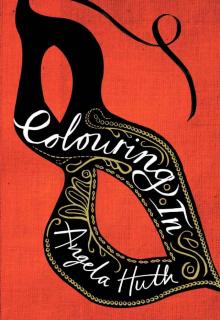- Home
- Angela Huth
Colouring In Page 7
Colouring In Read online
Page 7
He said all that so easily, so honestly, it was hard not to believe he spoke anything but the truth. A silence fell between us. I finished my glass of wine, loathe to ask more questions. Then he said, very quietly: ‘but she’s not my type. So please, you and Dan – please don’t go trying to match-make. It wouldn’t work … for either of us,’ he added. ‘I’m sure she’s not got designs on me. I’m not nearly exciting enough. I’m not cutting edge – can a man be cutting edge?’ We both smiled, laughed, and the almost indecipherable moment of awkwardness was dispelled. ‘I don’t think we had any ideas of match-making,’ I said with what was meant to be a kind of mock affront. ‘Obviously it wouldn’t work. Much though I love Carlotta, she’s something of a control freak. You’d be consumed. She’d exhaust you. She’d…’
‘Yes, yes, I know,’ he said. And re-filled my glass.
There was a long silence between us. My head spun with alternatives. Where to go from here, I wondered? I’d become too heated about Carlotta. Too disloyal. Had he noticed? The subject of her should definitely be closed, or he might say something I had no desire to hear. Eventually I asked whether he would like fruit, cheese, anything? ‘What I’d like,’ he said, ‘is to see your work.’
To see my work? I heard my own gasp. ‘But nobody ever wants to see masks in progress,’ I said, ‘there’s nothing much to see.’
‘Please,’ he said. ‘I’d like to see the place where you spend your days.’
‘Mornings only,’ I corrected.
I could not remember anyone else ever following me up the stairs eager to see my studio, my work. It was both a pleasing and an alarming prospect. Very few people are interested in someone else’s work if it’s not in their own field. I understand that. There’s something rather alien about being a curious spectator, asking questions, knowing the answers are unlikely entirely to clarify. I never ask Carlotta about the nature of her work: in truth it doesn’t interest me. She certainly doesn’t ask about mine, though on occasions, when she’s seen a mask downstairs waiting to be delivered, she comes up with extravagant praise that means nothing to me. I never ask Dan more than functional questions about his business because that holds little interest for me, either. I’d like to enquire about his writing, but know better than to do so. Writers, artists, musicians, shouldn’t be interrogated. Their work is their answer. I believe that firmly. I suppose it’s all right to question someone like me, a simple craftsman, on how we do it: ‘I pick up a minuscule bead with a pair of tweezers, dab it in a speck of glue.’ To questions about technique I’ve given such answers, and I don’t mind, because I know I will never be asked what it’s all about to me. I doubt anyone would ever guess the maker of masks finds herself marinating her masks with hopes and fears – unease at times, and vast happiness at others. I knew that Bert would never ask questions about that side of things, so I felt quite safe. But puzzled. And a little… Had I drunk a glass more than usual? Why was my heart so beating?
I opened the door. Went to my work table, switched on the shaded light. There were many other lights I could have put on – ready for the rare occasions I can get away to work in the evening – but I did not want to. I think I must have wanted Bert to be a little puzzled by what he saw … mystified. I think I wanted him to sense, just very faintly, what I try to do.
I turned and saw him standing in the doorway. His arms hung at his sides. His fists were clenched. Even in the dim light I could see his knuckles, two small arcs of white pebbles. I didn’t look at his face – not wanting, just yet, to see his reaction. But I saw him swallow, and take a cautious step into the room as if he was treading water.
BERT
I fell in love with Isabel at that moment.
That moment when she switched on the light and turned to me, not meeting my eye, and stood by her table slightly quivering as if touched by the merest breeze. In the imprecise light I could see nothing clearly, but was aware of swarms of empty faces, their hollow eyes upon me. Many of them sprouted plumes and ribbons and clumps of frothing materials sparkling with crystals no bigger than a wren’s eye, and beads. I was aware of bright, glorious colours struggling against the dimness of the room. I felt a sense of curious life, there, a kind of soaring, as in music.
‘This is all it is,’ Isabel said at last. God knows how long we had stood in petrified silence. It may only have been a second or two. ‘There’s nothing much to see,’ she added.
That was not true. She knew it was not true, but it didn’t matter. I nodded, not knowing what to say.
I hadn’t expected any of this, of course. In the single evening spent with Isabel, Dan and Carlotta, I’d felt a kind of ease with her, a joy in her presence and her laughter. But perhaps that was just in comparison with Carlotta, for whom I felt nothing but vague gratitude for her offers of help. This evening, in the car, Isabel’s delight had stirred me a little further. But I swear the drive was no more than a confirmation of my liking. Had I thought there was any danger of being assailed by more potent feelings for my best friend’s wife, I would never have agreed to spend this evening alone with her. And indeed at supper all was normal. Quiet, enjoyable. She talked a lot about Dan. She loves him. They’re as happily married as any couple can hope to be – I sensed that. We talked about the changes I’d been finding in London since I left. She gave me news of mutual friends.
It was when conversation turned to Carlotta I felt a sense of puzzlement. Isabel’s feelings for her friend are ambivalent. While plainly she loves and admires her, she also disapproves of her values, her bossy control, her arrogance. Was there, I wondered, also a tinge of jealousy in the mix? Surely not: Isabel would hate Carlotta’s life. She loves her own. What on earth was there to be jealous of?
Clearly Isabel was warning me off any serious involvement with Carlotta. I assured her that wasn’t necessary – last thing on my mind. But I wanted very much to stop talking about Carlotta. She holds little interest for me. I wanted to know more about Isabel, and here was my chance. So to kill two birds with one stone, as it were, I asked to see her studio, her work.
I’ll never forget the look of total horror on her face when I asked this question. It was hard to know why her reaction was so extreme, and for a moment I felt like the most crass of intruders. Then she gave me a half smile, and with relief I realised I’d done no wrong. Merely surprised her.
All the way up the stairs – three floors, following a little behind her long skirt of swaying blue silk – I suspected nothing. I can assure you, Officer, no such thought was on my mind. I was absolutely innocent. Then, the opening of that door to her secret place. The turning on of the light. The apotheosis.
‘All about hiding,’ I said … when eventually I could speak.
‘I suppose so,’ Isabel answered – so dully, I thought, perhaps she didn’t agree and had no desire to argue such a matter.
‘I imagine you’ve been through all the metaphorical thoughts about masks,’ I went on uncertainly. I added a slight laugh to convey that I was being pretentious on purpose.
‘Oh yes,’ she answered with a shrug. Then: ‘do you like them?’
‘Like is hardly the word I’d use,’ I replied. ‘I can’t see them very well. I’m bewildered by what I can see.’
‘Good.’
‘They’re beautiful.’
‘I’m not going to put on any more lights.’
‘No.’
I moved closer to a shelf where three feathered masks were placed, and was suddenly gripped by the illusion that they were preening themselves with invisible beaks. I turned to Isabel so fast that for a second all the masks in the room seemed to stir. I would not have been surprised if with one accord they had spread their wings and flown out of the open window. I could understand why some people suffer from phobias about masks. This was some kind of madness more disturbing than jet lag.
Isabel suggested we return downstairs and open another bottle of wine. Her voice was firm now. I could see she had no intention of explaining anything
. I could also see she had no idea of what was happening to me. She hurried from the room. I quickly followed her, shutting the studio door behind me. Relieved to be leaving. Going down stairs I waited for normality to return, the moment of loving Isabel to be gone. But that did not happen. The thick stair carpet silenced our descent: the clatter of our footsteps on the bare boards of the kitchen floor were then cruel in their noise. Somehow I had lost a skin. I was raw, exposed, horrified by my state.
‘I know Dan would want us to choose something good,’ Isabel was saying. But she knew nothing of wine. Why didn’t I come with her and make the decision?
Once again I followed her. This time down steep steps to the cellar, a place on which Dan had spent a great deal of money to make it fit to accommodate his marvellous collection of wine. But for all the expensive air vents, there was a cellar smell – a sweet mustiness, the amorphous scent that’s a combination of old glass bottles, cobwebs, and labels fixed with ancient glue. Unlike most cellars, it was not lighted by crude neon strips but by copious down-lights scattered across the ceiling. Isabel turned on just two of them. Did she intend to leave so much shadow between the discs of light? I don’t know… Probably not: probably my fevered imagining. She put out a hand to lead me to a particular shelf. I took it, gripping her fingers. When she paused, saying ‘I think this is it, Gilbert…,’ I snatched her to me. Her body bent, unresisting. With my free hand I touched her hair, to brush away a cobweb. To what? In truth, there was a trace of a cobweb, but it was also to kiss her. I felt her breath in my face for no more than a second. I saw – I think I saw – her lips were parted. Never in my life have I wanted a woman more. I was about to give in to my terrifying desire, clutch her to me with all the love that had gathered over the years and had had nowhere to go, when she screamed.
ISABEL
I knew what he wanted, what I wanted. In one of those appalled seconds in which huge quantities of life and reason are concentrated down into a pinprick of realisation, I screamed. Not out of fear. But to stop him. The sound was flattened by the low ceiling, but piercing. With no forethought, I slapped him hard on the face. He drew back, tongues of red from my fingers leaping up his cheek.
I will never forget his face. It had broken up, fallen into more fragments than I could count: astonishment, regret, fear – was it fear? Anger? I couldn’t read them all before the pieces closed back together making his face whole again. He didn’t put a hand to his cheek, as do people in films when they have been hit (why did such a thought come to me at such a moment?). He put a hand on my arm. This time I didn’t back away. I kept my voice very low.
‘I love Dan,’ I said. ‘Never, in a million years would I …’
‘Isabel,’ he said, ‘I was trying to brush away a cobweb from your hair. Not for anything in the world… would I, either. Look.’
He took something from my hair, showed me on his fingers the shattered part of a small cobweb. It glittered like the trail left by a snail, then was gone as he rubbed his fingers together.
He had been speaking the truth, then. A kind of truth. Shame at my behaviour suffused me: I knew my cheeks were scarlet. I felt idiotic, foolish. How could I have supposed…? How could I have thought his intentions were different? Could I have imagined my own nefarious feelings that had flared up just a moment ago? Even now, I longed for him to hold me while we both apologised for the silly misunderstanding.
I said I was sorry. He said he was, too. Then he took a bottle from the shelf and we went back upstairs. We drank half of the wine, talked easily of Dan and Sylvie and his desire to be settled – ‘whatever that means,’ he said – very soon. Between us loomed a semi-truth, and a deeper truth that was unacceptable, inadmissible – a truth I couldn’t help believing, for all his declaration of innocence.
It was past one when Gilbert left. When I opened the front door there was a blast of surprisingly cold air, and he hurried down the steps. I was denied a normal kiss on the cheek. Did he fear to touch me again? He said nothing about a future meeting. He went off in his ostentatious car with a squeal of tyres, like a teenage joy-rider. I scarcely slept for the rest of the night, re-living the moment of confusion in the cellar, wrestling with the truth – his and mine.
GWEN
Gary’s note must really have got to me, for I knew I couldn’t sleep if I went to bed. I watched rubbish on the telly, tried to take my mind off it. It was very hot in the flat. I felt stifled. I was afraid. I thought a breath of air might calm me down.
As I put on my jacket I knew I was being foolish. Women should not walk alone in London late at night. Even elderly women in headscarves are vulnerable, especially somewhere like Shepherd’s Bush. But I couldn’t stop myself.
Where should I go?
I didn’t know when I shut the door behind me – I didn’t think … I couldn’t think – but I found myself on my normal route to the Grants. My feet took me. It was a kind of instinct. And once I was on my way I felt happier. I’d just take a look at the house, all in darkness. Imagining its rooms, which I’d be safely in, in a few hours time, would be comforting, I thought.
I didn’t let myself look for Gary in corners and shadows. He’d never think I’d be out on the streets so late. I just hurried along, head down. There were few people about. No one seemed to notice me. I hardly looked the kind to attract a mugger – didn’t even have my bag. A police car zipped by, siren screaming and lights flashing. That gave me confidence. I thought if something’s happened and police are about, well, there’s protection for the likes of me walking alone.
I reached the Grants’ street in my usual time, just under twenty minutes. There were hardly any lighted windows in the houses. Then, I must have been ten yards or so from number 18, when I saw all the downstairs lights were on and the curtains weren’t drawn. I stopped. Very unusual, I thought. When Mr. Grant is away Mrs. G likes to go to bed very early.
I stayed standing by the gate of a house across the road. A lot of greenery tumbled over the high fence. I stood in its shadow, wondering. Then I saw the front door open and a gentleman – a tall man – came out. He seemed to be in a hurry. Ran down the steps and into a great swanky silver-coloured car, and drove away with a squeal. Then I looked back at the front door and saw Mrs. G standing there. Her arms were folded under her chest as if she was feeling the cold – well, there was a cool night breeze even though it had been warm all day. She just stood there, looking after the car, frozen like a picture. I got the impression she was puzzled, even upset. The thought struck me that I should go over and say something. But what should I say? She’d be amazed I was out alone so late at night, and whatever concerned her was not my business. Just as my problems were not her business, and it was best to keep going as we always did, very friendly but knowing the dividing line. So when she turned and went back into the house, I left to walk home. All the time the picture of Mrs. G standing there was bright in my mind and I didn’t think about Gary any more, or the danger of being on the street so late. Eventually, I slept.
CARLOTTA
What’s going on? Bert hasn’t rung. Really annoying. I don’t quite know why I feel so annoyed, but I do. I’ve got masses of stuff to show him. But I’m going to hold out a bit longer. Then I shall just go round, unannounced. I mean, my patience is running out. Whose wouldn’t? I’ll wear that new black thing that shows off my cleavage. I’ll sit next to him on the sofa going through samples, and he won’t be able to contain himself. Meantime, Isabel might know something.
I rang her on Monday morning. There are always a few moments just after eight thirty when I know she’s free, after Dan and Sylvie have left and she hasn’t yet gone up to her studio. Absolutely dementing, the way she still refuses to have a telephone there. She was out. Gwen said Mr. Grant was still abroad so ‘Mrs G,’ as she calls her, was taking Sylvie to school.
Hell. I do hate the whole thing of having to make so many calls to get someone. I missed her mid-morning – she hardly took a coffee break this morning according to
Gwen – but managed to get her at lunch time. She was in one of her non-communicative moods, I could tell. She said Dan had had to go on to Africa and wasn’t coming home till tomorrow evening. She’d been alone all weekend, ‘catching up’ – whatever that means. I said ‘you should have rung me. Or asked Bert round to keep you company.’ She said ‘As a matter of fact he came to supper on Sunday night.’
He went to supper with her on Sunday night. Did he now?
I know Isabel. I don’t think she flirts in a calculated way, I really don’t. But I know the way she can look at men who interest her. A sort of gentle pressure of attention comes from her eyes that men can’t resist. Then there’s her walk. I tease her about it. She says it’s all because of deportment lessons which were mandatory in her school. Whatever: she slinks, in a much more subtle way than Marilyn Monroe, and those long soft skirts she will insist on wearing lap round her in a way that could drive a man to distraction. Maybe I’m exaggerating. I know she sends out a red light signal that tells everyone she loves Dan, and Dan only, and perhaps her beguiling ways are unconscious (actually, they couldn’t be, could they?), so there’s no point in men approaching her because they’ll be severely rebuffed. But I’ve seen men dream. I’ve seen them bewitched by her natural allure – which most of us women have to try to create … and that’s no substitute for the real thing.
‘What’s he up to?’ I asked, flat as anything, sounding as uninterested as you can get.
She said she didn’t know. He hadn’t made up his mind what to do, or been to see any of the people who were offering him jobs. Then she asked how I was getting on with doing up his house? I told her that I was engaged in the plan we’d talked about and, although I was ready to go, I hadn’t rung him. Her question provided a good reason to ask if he’d mentioned my name – wondering why I hadn’t come round with pots of paint, perhaps?

 Sun Child
Sun Child South of the Lights
South of the Lights Virginia Fly is Drowning
Virginia Fly is Drowning Of Love and Slaughter
Of Love and Slaughter Such Visitors
Such Visitors Once a Land Girl
Once a Land Girl Land Girls
Land Girls Colouring In
Colouring In Nowhere Girl
Nowhere Girl Monday Lunch in Fairyland and Other Stories
Monday Lunch in Fairyland and Other Stories Another Kind of Cinderella and Other Stories
Another Kind of Cinderella and Other Stories Invitation to the Married Life
Invitation to the Married Life Easy Silence
Easy Silence